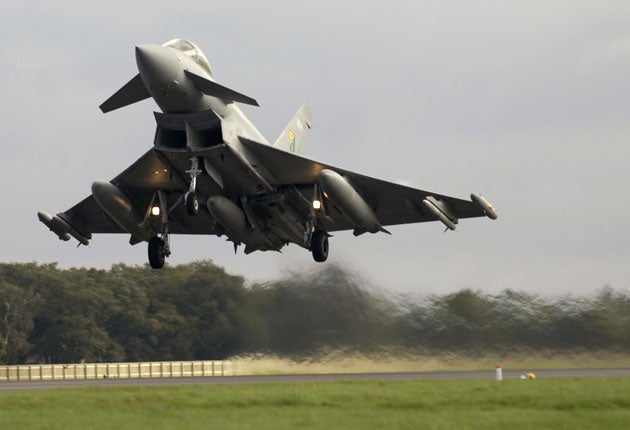RAF scrambles fighter jets after passenger flight terror alerts
Aircraft shadowed twice this month as threat of 9/11-style attack grows

Your support helps us to tell the story
From reproductive rights to climate change to Big Tech, The Independent is on the ground when the story is developing. Whether it's investigating the financials of Elon Musk's pro-Trump PAC or producing our latest documentary, 'The A Word', which shines a light on the American women fighting for reproductive rights, we know how important it is to parse out the facts from the messaging.
At such a critical moment in US history, we need reporters on the ground. Your donation allows us to keep sending journalists to speak to both sides of the story.
The Independent is trusted by Americans across the entire political spectrum. And unlike many other quality news outlets, we choose not to lock Americans out of our reporting and analysis with paywalls. We believe quality journalism should be available to everyone, paid for by those who can afford it.
Your support makes all the difference.Terrorist alerts on passenger jets have led to RAF fighters being scrambled more than a dozen times in the last 18 months, amid increasing intelligence reports of Islamist groups focusing on hijacking airliners.
Two of the incidents took place this month, with warplanes shadowing transatlantic flights.
Scrambled British fighters have a variety of options, including shooting down the airliners, if they are deemed to be an immediate threat. The decision on a course of action will be taken, on a chain of command active 24 hours, at "the highest level of government".
Details of the RAF's role in "homeland security" emerges in the wake of the plot to blow up a series of flights to America and the arrest on board a plane of the Nigerian "underpants bomber".
Warnings that al-Qa'ida was plotting to carry out another 9/11-type "spectacular" was one of the reasons behind the UK upgrading its security-alert status two months ago.
While the introduction of measures like body scanners at UK airports will help detect would-be hijackers, say the security agencies, the role of the RAF is essential in monitoring flights coming into British airspace.
While the emphasis is on guiding suspect flights to an airfield where further action, through negotiations or military action, can be taken, the eventuality, in an extreme case, of a flight having to be shot down, means, say defence officials, that a clear decision-making chain is necessary.
On 2 March this year, British authorities received a request for help after a passenger attempted to get into the flight deck of an American Airlines plane from Dallas to Heathrow. Tornado F3s from RAF Leuchars in Fife and Typhoons from RAF Coningsby in Lincolnshire were sent on an interception operation while Downing Street was informed of the possible emergency. Armed police were sent to an airport – the location of which cannot be given for security reasons – where the flight may have had to be diverted. On that occasion, however, it transpired that the passenger who was trying to get into the cockpit, a woman, had become distressed after a member of her family had become ill.
On 22 March, Typhoons were scrambled again from RAF Coningsby after UK air-traffic controllers picked up phrases including the words "ransom" and "hostage" on another flight from the US. The flight crew also asked for permission to carry out a sudden descent in order to "test" an auxiliary power unit, a procedure deemed highly unusual and thus suspicious.
The Typhoons shadowed the American flight across UK airspace into Belgium, where it landed. According to defence officials, "the matter was resolved", but no further information has been released as to what happened.
An RAF officer said: " What we have learned is that in the current climate we have to be ready for any eventuality. There are a variety of options one can take before going kinetic."
RAF jets have also been flying an increasing number of missions to counter "probing" flights by Russian aircraft – including a "Blackjack" capable of carrying a nuclear payload off the Hebrides on 10 March.
While the resumption of the Russian flights to test Nato reaction, following a post-Cold War thaw, is a sign of new belligerence by Moscow, "it is absolutely nothing like as dangerous as the prospect of al-Qa'ida taking over a plane and crashing it into a population centre", said aviation security consultant Alan Pilton.
"The point of origin of many of these flights are from places where the security is not so good, and that is the reason we have to face the nightmare scenario of a hijacked passenger air-liner flying into UK airspace," he said.
Join our commenting forum
Join thought-provoking conversations, follow other Independent readers and see their replies
Comments